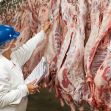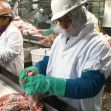No one disputes that four employees at Tyson Foods’ pork production plant in Waterloo, Iowa died of COVID-19 in 2020. But did they contract the deadly disease at work due to Tyson’s gross negligence? And will it be up to an Iowa state court or a federal court to decide? After a year bouncing jurisdictions, a Court of Appeals ruled that the two cases, filed by surviving relatives of the workers, belong in state court.
Writing for a unanimous three-judge panel, Circuit Judge Jane L. Kelly of the United States Court of Appeals for the Eighth Circuit ruled that plaintiffs’ claims for fraudulent misrepresentation and gross negligence must be heard in Iowa state court. In preceding months, Tyson had successfully removed both cases to federal court.
Tyson had argued that its actions “were taken at the direction of a federal officer” and were the result of President Trump’s invocation of the Defense Production Act (DPA). This Act gave Trump emergency authority to control domestic industries, and which Tyson claimed “raised substantial and disputed issues of federal law which must be decided by a federal forum.”
The United States District Court for the Northern District of Iowa consolidated the cases and ruled that Tyson had failed to satisfy the necessary elements for removal to federal court. In addition, it said plaintiffs had asserted state-law tort claims instead of federal ones. The cases were then remanded to state court. On January 3, the remand was affirmed by the Eighth Circuit.
Tyson, best known for poultry production, is a mega-corporation. In addition to poultry products, it owns Hillshire Farm, Ball Park franks, aidells sausage company, Gallo salame, Jimmy Dean and Sara Lee, among other brands that are household staples. In March and April 2020, 2,800 of its employees worked at a plant that was experiencing a “significant COVID outbreak.” A thousand were infected and four died. When relatives of two of the dead workers sued in Iowa state court, Tyson tried to get the case sent to federal court because, it argued, the plant was operating under “federal authority.”
The facts of plaintiffs’ wrongful death cases paint an ugly picture. In April 2020, Tyson took a few steps to control the pandemic in the early days of the disease, yet plaintiffs claim there were no work stoppages, despite spiking employee illnesses. They say the company encouraged workers to go to work while they were sick, and say that there was a lack of “sufficient face coverings or other protective equipment” along with a “failure to enforce or implement social distancing.”
Workers transferred to the Waterloo plant from another facility in Columbus Junction that had shut down due to COVID-19 were not required to be tested or quarantined. Supervisors also denied the “existence of confirmed cases.” The New York Times described conditions in the Waterloo plant where “low-wage workers typically stand elbow-to-elbow to do the work of cutting, deboning and packing meat, making them particularly vulnerable to the airborne virus.”
The plant, which reported over 1,000 cases of COVID-19, was finally shut down from April 22 to May 7. Four workers died of COVID-19 from April 18 to May 25.
Tyson’s defense states that is was staying open because it was acting under federal authority. It is based on government actions that followed then-President Trump’s declaration that the COVID-19 pandemic was a national emergency. As a result, various government agencies, including the United States Department of Agriculture (USDA), which regulates the meatpacking industry, acted to “address disruptions in various industries…to ensure they had the necessary supplies to continue operating.” Tyson pledged that its employees were “going to work 24 hours around the clock,” and the company was among those publicly thanked by Vice President Mike Pence for doing so.
Other government actions cited by Tyson included USDA’s Food Safety and Inspection Service (FSIS) sending a letter to slaughterhouses and meatpacking facility managers that said it “sought a united effort” with industry partners about screening employees for COVID-19. Additional guidance from the federal government followed, including Trump’s March 16 “Coronavirus Guidelines for America.”
These included a statement that employees who “work in a critical infrastructure industry…such as…food supply…have a special responsibility to maintain (their) normal work schedule…and should follow guidance from the Centers for Disease Control to protect their health at work.” Despite this federal announcement, the government’s directive also stated, “State and local officials should use their own judgment in . . . issuing implementation directives and guidance” and that “critical infrastructure industry partners will use their own judgment (informed by the feral government) to ensure continued operations.”
In May 2020, President Trump explicitly named meatpacking as a producer of “critical and strategic” materials covered by the DPA. Tyson said the president ordered USDA to ensure that meat and poultry processors continue operations” consistent with CDC and other federal guidelines. Later that month, the Secretary of Agriculture echoed Trump’s words.
After stating the facts in Tyson’s removal motion, Judge Kelly’s opinion explained the precedent that must be followed to remove a civil action to federal court. She wrote, “A defendant may not remove a case to federal court unless the plaintiff’s complaint establishes that the case arises under federal law.” This could only occur if Tyson showed it: “acted under the direction of a federal officer;” established a “causal connection between (itself)” and an official authority; has a “colorable defense to plaintiff’s claims” and proves that it is a “person” within the meaning of the statute.
Tyson met none of these criteria for removal to federal court. The Judge wrote that “being subject to pervasive federal regulation alone is not sufficient to confer federal jurisdiction.” She also found that Tyson’s claim that “food and agriculture” were designated as “critical infrastructure” was exaggerated because it did not fulfill a basic governmental task. It is “not the duty of the federal government to process meat for commercial consumption,” she wrote. The opinion also found that Trump’s linkage of the DPA with meatpacking took place after Tyson had already closed it Waterloo plant.
Tyson never provided a reason why it preferred federal court. Perhaps its owners felt federal courts would be more easily persuaded to support actions by federal agencies during a pandemic. Or perhaps they thought juries would favor a company that decide to protect its workers after so much illness and death. Tyson instituted what The New York Times called “the boldest mandate in the corporate world,” when it ordered all of its 120,000 workers, many of whom lived in the notoriously anti-vaccine South and Midwest, to get the shots if they wanted to continue in their jobs (unless they were exempt).
Or maybe Tyson feared repercussions from hometown juries who were outraged by the lethal conditions faced by their friends and neighbors who worked at Tyson’s plants. And maybe they will remember a CNN story that was headlined, “Managers at Tyson meat plant had betting pool on how many workers would get Covid.”






